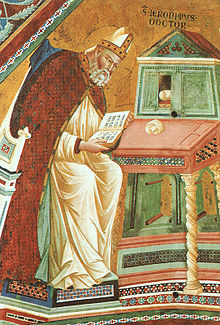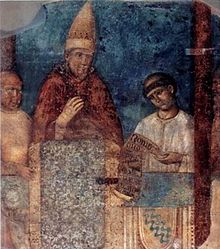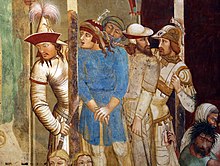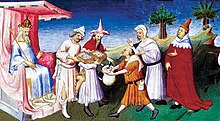
Mongol elements can be seen in European works of art ranging from the 13th to the 15th century. They encompass artistic areas such as painting and textile manufacture, and mainly consist in the European use of Mongol 'Phags-pa script in Medieval European art, as well as the representation of "Tartar" cloth and Mongol soldiers in a number of contemporary European paintings.
Mongol script in medieval art

During the period of interaction between the Mongols and the West, from the late 13th century to early 14th century, some Italian painters incorporated Mongol script (particularly the 'Phags-pa script) into their religious painting. Examples can be seen especially in the frescos of the Upper Church of San Francesco at Assisi, or in the paintings of Giotto and related painters.

These inscriptions often imitated the Mongol 'Phags-pa, probably discovered by the artists through Mongol paper money or paiza (travel passes) such as those Marco Polo was issued with during his travels. Frescos of Saint Jerome, Augustine and Pope Gregory I in the Church of San Francesco in Assisi (1296–1300) are known where they study books written in pseudo-Mongol. The famous Renaissance painter Giotto and his pupils often combined Arabic and 'Phags-pa script in their paintings. In Giotto's The Crucifixion (1304-1312/1313), soldiers wear tunics inscribed with pseudo-Mongol bands. In Giotto's Madonna and Child (1320–1330), the Virgin Mary's robe is decorated with a hem in a mix of Arabic and Mongol script. Giotto again used the Mongolian script in the Scrovegni Chapel.
Besides the influence of exchanges between the Western and Mongol realms during the period, the exact reason for the incorporation of Mongol script in early Renaissance painting is unclear. It seems that Westerners believed 13–14th century Middle-Eastern scripts (such as Mongol and Arabic) to be the same as the scripts current during Jesus's time, and thus found it natural to represent early Christians in association with them. This may have been partly because some objects from the Islamic era with inscriptions were treated as relics. Another reason might be that artist wished to express a cultural universality for the Christian faith, by blending together various written languages, at a time when the church had strong international ambitions. Possibly, the usage of Mongol cultural markers was also a way to express the eastern links of European religious orders such as the Franciscans.
In the East, a certain degree of cultural and artistic interaction is known due to the development of Christianity among the Mongols. The use of the Mongol script in association with representations of Christianity can be seen for example in Nestorian Christian steles, such as those found in Quanzhou which are dated to the 14th century.
The use of Phags-pa Mongol script in Medieval European painting had remained unnoticed however, until it was first identified in the 1980s by the Japanese scholar Hidemichi Tanaka. His findings were published in his 1983 paper The Mongolian Script in Giotto Paintings at the Scrovegni Chapel at Padova. Kufic Arabic script is even more often used in a similar way, known as Pseudo-Kufic.
-
 Giotto's Crucifixion with soldier wearing headband in pseudo-Mongol script, circa 1330.
Giotto's Crucifixion with soldier wearing headband in pseudo-Mongol script, circa 1330.
-
 Madonna and Child with Saints and Angels, Filippo di Memmo, Siena, circa 1350.
Madonna and Child with Saints and Angels, Filippo di Memmo, Siena, circa 1350.
-
 Saint Lawrence, by Fra Filippo Lippi, circa 1440.
Saint Lawrence, by Fra Filippo Lippi, circa 1440.
Mongol Empire "Tatar" textiles in medieval art
Main article: Tartarium
Around 1300, an influx of Mongol Empire textiles found their way to Italy, and were to prove quite influential in Italian art. These textiles even revolutionized Italian textile designs. Between 1265 and 1308, communications between Western and Il-Khanid rulers led to numerous exchanges of people and presents, as when about 100 Mongols in Mongol dress visited Rome for the Papal Jubilee of Pope Boniface VIII in 1300. Large quantities of panni tartarici (Tatar cloth) were recorded in the Papal inventory of 1295, and must have been diplomatic gifts from the Il-Khanate. Later on, Western merchants were also able to purchase such textiles from Tabriz, and the Mongol capital of Sultaniya, established by Öljaitü between 1305 and 1313, and until the capture of the Cilician Armenia harbour of Ayas by the Mamluks in 1347. The Tatar cloths were a produce of transcultural exchange under Mongol rule. They are described as Mongol nasij cloth, coming from Mongol, by author Lauren Arnold.

Mongol Empire textiles had a strong impact on Italian textile design from around 1330. A type of Tartar cloth that was adopted in the West consisted in small-pattern designs in dense composition. This sort of textile is represented in the clothing of the angel Gabriel in the Annunciation by Simone Martini (1333).
Other designs involved naturally flowing compositions of flowers and vines with fantastic animals. Such a textile is depicted as the background curtain in Giotto's Coronation of the Virgin (circa 1330), the earliest such depiction of a Tartar cloth. Chinese types of floral designs were also adopted, as visible in the mantles of Christ and Mary in Coronation of the Virgin by Paolo Veneziano (circa 1350).
Transmission of Chinese textile designs from the Mongol Yuan Dynasty also occurred: Textiles of Iran and Iraq in the 14th century incorporated Chinese phoenix designs in silk and gold thread, and Italian weavers adopted such designs from the second half of the 14th century, complete with phoenix designs and silk and gold thread. These designs are of Chinese origin, and reached Europe via the Mongol realm.
-
 Fig. 28: Chinese-style floral designs are visible in the mantles of Christ and Mary in Coronation of the Virgin by Paolo Veneziano (circa 1350).
Fig. 28: Chinese-style floral designs are visible in the mantles of Christ and Mary in Coronation of the Virgin by Paolo Veneziano (circa 1350).
-
 Lampas with phoenix, silk and gold, Iran or Iraq, 14th century.
Lampas with phoenix, silk and gold, Iran or Iraq, 14th century.
-
 Lampas textile, silk and gold, Italy, second half of 14th century.
Lampas textile, silk and gold, Italy, second half of 14th century.
Mongols in European painting

Mongols are visible in a variety of European paintings from the 13–14th century. They suggest that Italian artists had been in direct contact with people from Tartary. The Mongols seen in the European paintings from the late 13th century and throughout 14th century are from a diverse ethnic population of the Golden Horde composed of Tatars, Mongols who adopted Islam later, as well as Finns, Sarmato-Scythians, Slavs, and people from the Caucasus, among others (whether Muslim or not). The horde's population of soldiers and commanders are from a diverse ethnic Mongols, Turkic Tatars, Europeans, with Mongols being the ruling core.


As early as 1253, during the initial encounters of the Mongols with the West following the Mongol invasion of Europe, Matthew Paris represented Mongol soldiers with their characteristic conical hat as cannibals in his Chronica Majora.
Later, the Mongols would appear in much less caricatural portrayals. The travels of Marco Polo to the Mongol Empire gave rise to opulent descriptions of the Mongol ruler Kublai Khan and his court.
Mongols were then occasionally incorporated in the work of European painters, particularly illustrations of events in Asia or the Holy Land. Among other works, Mongol horsemen appear in the Crucifixion of Saint Peter, Giotto, circa 1299, probably following the visit of Mongol visitors from the East, such as the Mongol delegation who is known to have participated to the 1300 Papal Jubilee in Rome.
Mongol archers are also shown shooting at Sebastian in Martyrdom of Saint Sebastian, Giovanni del Biondo, circa 1370, and Mongol commanders in uniform appear in Ambrogio Lorenzetti's Martyrdom of the Franciscans (1285–1348) with their characteristic conical hat decorated with a feather.
-
 Mongol horseman in the Crucifixion of Saint Peter, Giotto, circa 1299.
Mongol horseman in the Crucifixion of Saint Peter, Giotto, circa 1299.
-
 Ambrogio Lorenzetti's Martyrdom of the Franciscans (1285–1348) depicting the garb of a Mongol commander of a thousand (conical hat with the feather).
Ambrogio Lorenzetti's Martyrdom of the Franciscans (1285–1348) depicting the garb of a Mongol commander of a thousand (conical hat with the feather).
-
Mongol archer shooting at Sebastian in Martyrdom of Saint Sebastian, Giovanni del Biondo, circa 1370.
-
 Bargaining for the Cloth of Christ in Crucifixion, Master of the Trecento, circa 1350.
Bargaining for the Cloth of Christ in Crucifixion, Master of the Trecento, circa 1350.
Notes
- ^ Mack, p.61
- The subject has been especially described by Rosamond E. Mack, in Bazaar to Piazza: Islamic Trade and Italian Art, 1300–1600.
- "Texts of Jerome (Fig.43; destroyed in the 1997 earthquake), Augustine, and Pope gregory I are written in squared units of vertical, horizontal, and curved strokes that can be called pseudo-Mongol. Though the artist has aligned the units horizontally on the page in Western style, the script itself imitates 'Phags Pa, which is written vertically", Mack, p.52
- "During the Pax Mongolica a few Italian painters imitated a Mongol script called 'Phags Pa", in Mack p.51
- ^ The art, science, and technology of medieval travel by Andrea Kann p.94
- "The Assisi painters, and Giotto as is shown below, were imitating a Mongol script before 1307, when reports of Friar John of Montecorvino's success in Beijing arrived in the West, precipitating major missionary efforts in central Asia and China" Mack, p.51
- ^ Jesus on the Silk Road by Dale A. Johnson p.73
- Mack, p.52
- "The texts of Jerome (Fig.43, destroyed in the 1997 earthquake), Augustine and Pope Gregory I are written in squared units of vertical, horizontal, and curved strokes that can be called pseudo-Mongol. Though the artist has aligned the units horizontally on the page in Western style, the script itself imitates 'Pags Pa, which is written vertically" in Mack, p.52
- Mack, p.54
- Mack, p.52, Mack, p.69
- "Because the Arabic and 'Pag Pa were associated with the Holy Land and the Early Christian Era, the frames could emphasize the origin and age of the images they surround. Perhaps they marked the imagery of a universal faith, an artistic intention consistent with the Church's contemporary international program." Mack, p.69
- "Hidemichi Tanaka in a brilliant insight has persuasively established that Giotto was exposed to Mongol Phags-pa script, and that he used it as a decorative motif at Padua and elsewhere." in Arnold, p.124
- The Mongolian Script in Giotto Paintings at the Scrovegni Chapel at Padova in Europäische Kunst um 1300, Akten des XXV. Internationalen Kongresses für Kunstgechichte, 1983 The oliphant: Islamic objects in historical context Avinoam Shalem p.96 Note 56
- Mack, p.35-36: "A well-documented example of a delayed but creative Italian response to the new Tatar cloths is that of the tiny-pattern design, in which small leaves or plants and animals rhythmically organized in dense, allover composition. (...) During the early fourteenth century, the Angevins of Naples donated numerous Tatar cloths, including velvets, to San Franceso at Assisi. Since Simone executed the painting in Naples, the Tatar cloths, as well as Oriental carpets -also the earliest in Italian painting- and a particular crozier in Figure 65 probably represent prized artifacts at king Robert's court. Later Simone brilliantly captured the vibrant shimmering effect of the tiny pattern on a white ground in the archangel Gabriel's robe in the Annunciation painted for the cathedral of Sienna in 1333 (Fig. 23)" – Mack, p.35
- ^ "Simone Martini (...) depicted this angel wearing a robe of Mongol nasij cloth -a gold working of leaves on a white background- usually described in western inventories as panno tartarico albo ad floria aurea" in Princely gifts and papal treasures by Lauren Arnold p.121
- "The Pax Mongolica brought an influx of influential "Tatar" textiles into Italy about 1300 (see for example Fig. 22, 25, 32) and left its mark on fourteenth-century Italian art in Mongol figures, costumes (see Fig. 160), and script (see Fig. 43, 49) in paintings and in references to monuments along the caravan routes on the facades of the Doge's Palace in Venice (see Fig. 10)" in Mack, p.18
- "The fabrics that revolutionized Italian textile design beginning about the 1330s were the Tatar cloths arriving from Central Asia and Syria during the Pax Mongolica. Though they were foremost among imports in the Papal collections, probably thanks to diplomatic gifts from the Il-Khanids of Persia, the new imports attracted no attention from Italian painters for two more decades and from local designers for three.", in Mack, p.35
- Mack, p.18
- Mack, p.18, Mack, p.35
- Mack, p.16-17
- Mack p.35: "Tatars cloths were themselves products of transcultural exchange. As the nomadic Mongol warriors became imperial rulers, they adopted many aspects of the sophisticated textile cultures in conquered Islamic lands and developed a preference for silk lavishly ornamented with gold threads. Customarily, the Mongols spared skilled weavers -both Muslim and Chinese- from the sword, distributed them as booty, and transported them to new workshops scattered across the empire. Captive artisans served royal courts, the military and government officials, who were often recruited from the conquered. For example, it is known that Herati and Chinese craftsmen worked together, and some Herati were sent back to their homes in eastern Persia (now Afghanistan). The cultural mix among the imperial elite and the craftsmen working for them resulted in a rich and distinctive blend of Islamic and Chinese techniques and patterns."
- "In this fragment of the fresco, attributed to Giotto, Pope Boniface VIII proclaims the jubilee year of 1300. Over the balcony is a "Tartar cloth", one of the many silks presented by the Persian Mongol ruler, and distinguished by its rhythmic Sino-Mongolian pattern" "Silk" p.41 .
- Mack, p.35
- Mack, p.35-36
- ^ Mack, p.37
- ^ Mack, p.38
- Rosamond E.Mack, ISBN 0-520-22131-1 p.27-49
- Arnold, p.124
- Halperin, Charles J. (1987). Russia and the Golden Horde: The Mongol Impact on Medieval Russian History. Indiana University Press. p. 111. ISBN 978-0-253-20445-5.
- America views China: American images of China then and now by Jonathan Goldstein, Jerry Israel, Hilary Conroy p.36
- ^ Arnold, p.54
- ^ Arnold, p.113
- ^ Rosamond E. Mack, Bazaar to Piazza: Islamic Trade and Italian Art 1300–1600 (ISBN 0-520-22131-1), p. 151: "The Mongol physiognomies of the ruler and two warriors wearing tall pointed hats, however, were probably observed among emissaries whom the Il-Khanids sent to Italy during the first decades of the fourteenth century. This hat with a neck-covered flap and feather on top accurately depicts the headgear of commanders of one thousand men in the Mongol army. Such headgear might even have been seen in Siena: perhaps Tommaso Ugi, a Sienese who had taken the name Tumen, had visited Siena when he accompanied the Il-Khanid emissaries in 1301."
- ^ Mack notes the "Mongol figures and costumes" in the painting: "Mongol figures, costumes (see Fig. 160)", Mack, p.18
References
- Mack, Rosamond E. Bazaar to Piazza: Islamic Trade and Italian Art, 1300–1600, University of California Press, 2001 ISBN 0-520-22131-1
- Arnold, Lauren Princely Gifts and Papal Treasures, University of San Francisco, 1999 ISBN 0-9670628-0-2